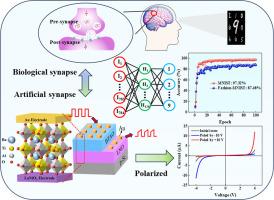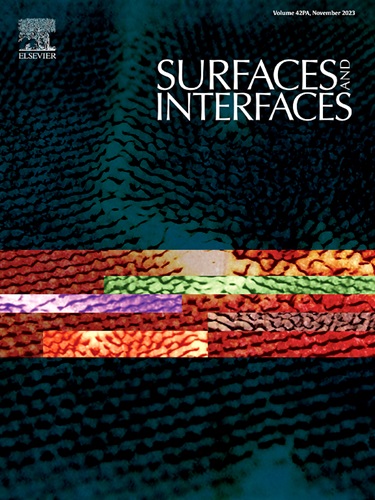Artificial photoelectric synaptic devices with ferroelectric diode effect for high-performance neuromorphic computing
IF 5.7
2区 材料科学
Q2 CHEMISTRY, PHYSICAL
引用次数: 0
Abstract
With the rapid advancement of artificial intelligence and machine learning, the demand for neuromorphic computing systems has intensified. High-performance artificial synaptic devices are crucial to achieving this objective. Ferroelectric diode artificial synaptic devices were prepared using aluminum-doped BaTiO3 (BTAO) thin films by a low-cost sol-gel method. These devices mimic the basic properties of biological synapses, such as long-term plasticity (LTP) and short-term plasticity (STP), under electrical stimulation. Additionally, the devices exhibit an excellent UV light response, enabling the transition from STP to LTP by adjusting the light pulse intensity, width, and number of pulses. Aluminum doping significantly enhances the ferroelectricity of BaTiO3 films, increasing the Pr from 2.31 µC/cm² to 9.08 µC/cm². By modulating the Schottky barrier through polarization, the BTAO films exhibit a switchable diode effect, which facilitates fine-tuning of the synaptic connection strength while maintaining synaptic stability. Recognition accuracies of 97.32 % for the MNIST dataset and 87.48 % for the Fashion-MNIST dataset were achieved by convolutional neural network simulations. These results suggest new possibilities for brain-like processing with ferroelectric diodes.

用于高性能神经形态计算的具有铁电二极管效应的人工光电突触器件
随着人工智能和机器学习的快速发展,对神经形态计算系统的需求也在不断增加。高性能人工突触器件对于实现这一目标至关重要。利用低成本溶胶-凝胶法,使用掺铝 BaTiO3(BTAO)薄膜制备了铁电二极管人工突触器件。这些器件模拟了生物突触在电刺激下的基本特性,如长期可塑性(LTP)和短期可塑性(STP)。此外,这些器件还具有出色的紫外光响应能力,通过调整光脉冲强度、宽度和脉冲数,可以从 STP 过渡到 LTP。铝掺杂大大增强了 BaTiO3 薄膜的铁电性,使 Pr 从 2.31 µC/cm² 提高到 9.08 µC/cm²。通过极化调节肖特基势垒,BTAO 薄膜表现出了可切换的二极管效应,这有助于微调突触连接强度,同时保持突触稳定性。通过卷积神经网络模拟,MNIST 数据集的识别准确率达到 97.32%,时尚-MNIST 数据集的识别准确率达到 87.48%。这些结果为利用铁电二极管进行类脑处理提供了新的可能性。
本文章由计算机程序翻译,如有差异,请以英文原文为准。
求助全文
约1分钟内获得全文
求助全文
来源期刊

Surfaces and Interfaces
Chemistry-General Chemistry
CiteScore
8.50
自引率
6.50%
发文量
753
审稿时长
35 days
期刊介绍:
The aim of the journal is to provide a respectful outlet for ''sound science'' papers in all research areas on surfaces and interfaces. We define sound science papers as papers that describe new and well-executed research, but that do not necessarily provide brand new insights or are merely a description of research results.
Surfaces and Interfaces publishes research papers in all fields of surface science which may not always find the right home on first submission to our Elsevier sister journals (Applied Surface, Surface and Coatings Technology, Thin Solid Films)
 求助内容:
求助内容: 应助结果提醒方式:
应助结果提醒方式:


